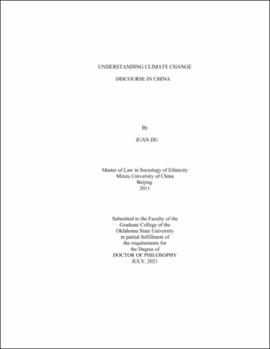| dc.contributor.advisor | Mix, Tamara | |
| dc.contributor.author | Du, Juan | |
| dc.date.accessioned | 2022-01-21T19:19:50Z | |
| dc.date.available | 2022-01-21T19:19:50Z | |
| dc.date.issued | 2021-07 | |
| dc.identifier.uri | https://hdl.handle.net/11244/333751 | |
| dc.description.abstract | China plays a significant role in the international climate regime. Past studies focus on analysis of climate change policies and examine micro-level climate change concerns quantitatively. Using 1736 reports from four different official newspapers, I focus on climate change discourse in two types of newspapers in China: politically-oriented and industry-oriented. I employ framing theory from social movement and communication studies to examine strategies employed by the official media to gain support for climate change-related policies and industry structural shifts. The responsibility frame is employed the most by politically-oriented newspapers. This frame helps fulfill tasks of defining the reality and causes of climate change and legitimize the possible solutions to climate change. Industry-oriented media adopt the frame of economic consequences to rationalize solutions to climate change and gain support from traditional energy interest groups. Using 1613 posts on climate change from an online social Q&A community, I obtain nuanced understandings of climate change concerns on the micro-level in China. Four types of climate change skepticism are identified: reality skepticism, which doubts the facts of climate change; causality skepticism, which questions the relationship between human activities and climate change; epistemic impact skepticism, which challenges the impacts of climate change; and mitigation skepticism, which focuses on the specific solutions to climate change. Compared to unified frames in the official media, the frames identified in online posts are diverse. The existence of climate change skepticism reflects inconsistencies between macro-level and micro-level discourses on climate change. In addition, the underlying ideologies are essential factors contributing to the discrepancies. Nationalist ideologies, which permeate the official media to enhance social cohesion and group affection, produce discordant attitudes toward climate change in online forums. The present study connects and compares macro- and micro-level discourses on climate change to provide implications for climate change communication. In addition, this project is significant in outlining how political and cultural contexts in China influence coverage of climate change in official media and individual perceptions of climate change. | |
| dc.format | application/pdf | |
| dc.language | en_US | |
| dc.rights | Copyright is held by the author who has granted the Oklahoma State University Library the non-exclusive right to share this material in its institutional repository. Contact Digital Library Services at lib-dls@okstate.edu or 405-744-9161 for the permission policy on the use, reproduction or distribution of this material. | |
| dc.title | Understanding climate change discourse in China | |
| dc.contributor.committeeMember | Dunlap, Riley | |
| dc.contributor.committeeMember | Long, Michael | |
| dc.contributor.committeeMember | Liu, Chung-En | |
| dc.contributor.committeeMember | Vadjunec, Jacqueline | |
| osu.filename | Du_okstate_0664D_17308.pdf | |
| osu.accesstype | Open Access | |
| dc.type.genre | Dissertation | |
| dc.type.material | Text | |
| dc.subject.keywords | china | |
| dc.subject.keywords | climate change discourse | |
| dc.subject.keywords | official media | |
| dc.subject.keywords | social q&a community | |
| thesis.degree.discipline | Sociology | |
| thesis.degree.grantor | Oklahoma State University | |
